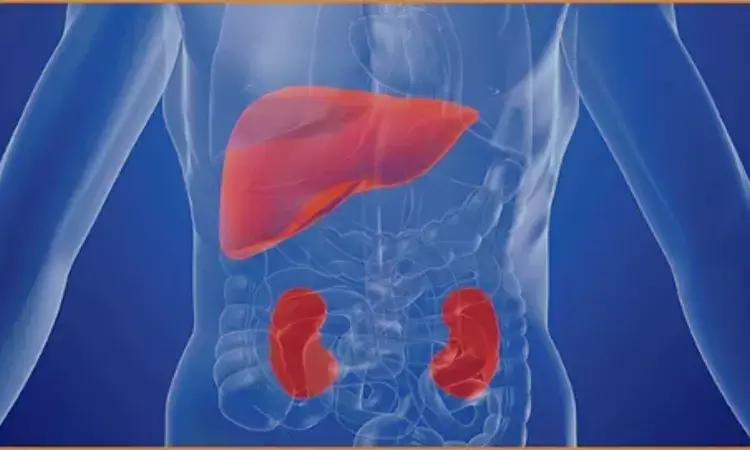- Home
- Medical news & Guidelines
- Anesthesiology
- Cardiology and CTVS
- Critical Care
- Dentistry
- Dermatology
- Diabetes and Endocrinology
- ENT
- Gastroenterology
- Medicine
- Nephrology
- Neurology
- Obstretics-Gynaecology
- Oncology
- Ophthalmology
- Orthopaedics
- Pediatrics-Neonatology
- Psychiatry
- Pulmonology
- Radiology
- Surgery
- Urology
- Laboratory Medicine
- Diet
- Nursing
- Paramedical
- Physiotherapy
- Health news
- Fact Check
- Bone Health Fact Check
- Brain Health Fact Check
- Cancer Related Fact Check
- Child Care Fact Check
- Dental and oral health fact check
- Diabetes and metabolic health fact check
- Diet and Nutrition Fact Check
- Eye and ENT Care Fact Check
- Fitness fact check
- Gut health fact check
- Heart health fact check
- Kidney health fact check
- Medical education fact check
- Men's health fact check
- Respiratory fact check
- Skin and hair care fact check
- Vaccine and Immunization fact check
- Women's health fact check
- AYUSH
- State News
- Andaman and Nicobar Islands
- Andhra Pradesh
- Arunachal Pradesh
- Assam
- Bihar
- Chandigarh
- Chattisgarh
- Dadra and Nagar Haveli
- Daman and Diu
- Delhi
- Goa
- Gujarat
- Haryana
- Himachal Pradesh
- Jammu & Kashmir
- Jharkhand
- Karnataka
- Kerala
- Ladakh
- Lakshadweep
- Madhya Pradesh
- Maharashtra
- Manipur
- Meghalaya
- Mizoram
- Nagaland
- Odisha
- Puducherry
- Punjab
- Rajasthan
- Sikkim
- Tamil Nadu
- Telangana
- Tripura
- Uttar Pradesh
- Uttrakhand
- West Bengal
- Medical Education
- Industry
Lactate Dehydrogenase Levels Predict Severity of MAFLD and Metabolic Syndrome: Study Finds

China: A recent cross-sectional study conducted in Hefei, China, has identified serum lactate dehydrogenase (LDH) levels as a potential novel predictor for the severity of metabolic dysfunction-associated fatty liver disease (MAFLD). The study, published in Diabetes, Metabolic Syndrome and Obesity, found that patients with metabolic syndrome (MetS) had higher LDH levels (214.1 U/L) compared to those without (188.7 U/L).
"Patients with metabolic-associated steatohepatitis (MASH) also showed higher LDH levels. LDH levels were positively linked to the severity of MAFLD, including fibrosis grades ≥1, ≥2, and ≥3, and at-risk MASH," the researchers reported.
Metabolism-associated fatty liver disease, affecting most obese patients, is linked to metabolic syndromes like type 2 diabetes, obesity, liver damage, and severe liver conditions. The new definition of MAFLD underscores the role of metabolic disorders in its pathogenesis. Liang Yu, from The Second Affiliated Hospital of Anhui Medical University in Hefei, People’s Republic of China, and colleagues aimed to evaluate the relationship between lactate dehydrogenase levels and the severity of MetS and MAFLD, as well as the potential diagnostic role of LDH in identifying individuals at risk for metabolic associated steatohepatitis.
For this purpose, the researchers conducted a cross-sectional, real-world retrospective study, enrolling 1,118 obese patients from the Department of Bariatric Surgery at the Second Affiliated Hospital of Anhui Medical University between January 1, 2018, and December 31, 2021. Of these, 855 patients were included in the study cohort. MAFLD was defined based on the presence or absence of fatty liver disease, confirmed by histologic liver biopsy, postoperative pathology slides, or hematology, and meeting one of the following conditions: overweight or obesity, type 2 diabetes mellitus (T2DM), or metabolic dysfunction.
Serum LDH activity levels were measured in 885 patients, and logistic regression was employed to analyze the association between LDH levels, metabolic syndrome, and the severity of MAFLD.
Key Findings:
- In the study cohort of 855 obese patients, 70.6% were diagnosed with metabolic syndrome.
- Patients with MetS had significantly higher serum LDH levels (214.1) than those without MetS (188.7).
- Serum LDH levels were notably higher in patients with hypertension, central obesity, diabetes or hyperglycemia, elevated triglycerides, or low levels of high-density lipoprotein (HDL).
- LDH concentrations increased progressively with total number of MetS components in each patient.
- Subjects with metabolic-associated steatohepatitis (MASH) had significantly higher LDH levels than patients in the less severe non-MASH groups, including normal liver, simple fatty steatosis, and B.MASH.
- Logistic regression analysis revealed a significant positive correlation between LDH levels and MAFLD, B.MASH, MASH, at-risk MASH, and various fibrosis grades (≥1, ≥2, ≥3).
"The study is the first clinical investigation to confirm that serum LDH levels are significantly elevated in patients with MetS and that LDH is an independent predictor of MetS presence in the study population. Based on these findings, serum LDH shows promise as a potential biomarker for MetS, though additional studies are required to establish its clinical utility," the researchers concluded.
Reference:
Yu L, Bao S, Zhu F, Xu Y, Zu F, Liu Y, Jiang R, Chen S, Chen W. Serum Lactate Dehydrogenase Is a Novel Predictor for the Severity in the Patients With MAFLD: A Cross-Sectional Study in Hefei, China. Diabetes Metab Syndr Obes. 2025;18:345-361. https://doi.org/10.2147/DMSO.S492153
Dr Kamal Kant Kohli-MBBS, DTCD- a chest specialist with more than 30 years of practice and a flair for writing clinical articles, Dr Kamal Kant Kohli joined Medical Dialogues as a Chief Editor of Medical News. Besides writing articles, as an editor, he proofreads and verifies all the medical content published on Medical Dialogues including those coming from journals, studies,medical conferences,guidelines etc. Email: drkohli@medicaldialogues.in. Contact no. 011-43720751


